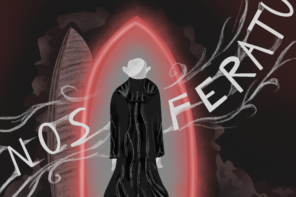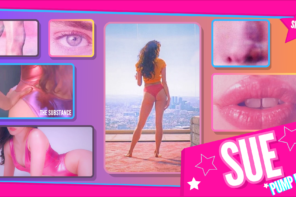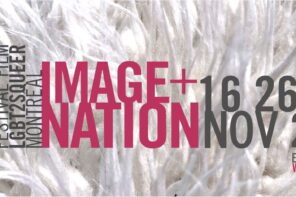This article contains major spoilers for Jojo Rabbit.
A few minutes into Taika Waititi’s Jojo Rabbit, the Academy Award-winning “anti-hate satire” about a member of Hitler Youth who discovers that his mother is hiding a Jewish girl in their home, I was reminded of an incident that occurred in my own life just a few months ago. Walking around the Imperial War Museum in London, I rounded the corner to find a child trying on a prop S.S. hat that the museum apparently supplies for visitors. “Heil Hitler!” he chirped, no more than 9 or 10 years old, the cap nearly dangling over his eyes. “Heil Hitler!” His mother, watching him from a nearby bench, looked on and said nothing.
Jojo Rabbit, quite similarly, is a movie that says, well, nothing. It, too, has a mother figure whose best effort to reverse her son’s conditioning amounts to shaking her head and wondering where her little boy has gone. The film operates on the fallacy that, to contemporary audiences, there’s something remotely absurd about children blindly idolizing Hitler, shouting his name with fervour, flexing their arms and pointing their fingers to the sky. But, as our current ideological climate indicates, Hitler is not universally reviled; Nazi rhetoric hasn’t dissipated in the 75 years since the Holocaust. The film takes for granted that its audience is well-versed in the capacities of Nazi atrocity – and as a result, it hardly gives its monstrous characters the qualities to match.
The result is a two-hour misfire, a meandering Moonrise Kingdom with a Nazi twist. Given the opportunity to satirize some of the most unambiguously evil people in modern history, Waititi can’t muster more than goofy, idiot Hitler (played by the director himself) and gay-alcoholic-Nazi-with-a-heart-of-gold (Sam Rockwell, who needs to be investigated at this point). Even Stephen Merchant’s looming Gestapo officer doesn’t elicit the creeping sense of dread that he should. Jojo Rabbit’s villains are devoid of wickedness, but they sure do look funny saying silly things in a Nazi uniform!
This confusing absence of monstrosity leaves the film struggling to capture the fear-ridden tension suffocating Nazi Germany during its final days. Its worst perpetrators express little more than resignation as they accept the regime’s impending imperial defeat, and their monster – the Jew – is of minimal concern by the film’s end, to the point that Rockwell’s character encourages Jojo to pursue his “Jewish girlfriend” Elsa, the 17-year-old girl sheltered in Jojo’s deceased sister’s bedroom.
The result is a two-hour misfire, a meandering Moonrise Kingdom with a Nazi twist.
As the film’s apparent sole Jewish character, Elsa is repeatedly disserviced by the script. She has all of the melancholy of Rapunzel locked in a tower and none of the desperation of a Jew hiding from murder at the height of the Holocaust. She often comforts Jojo, though he frequently subjects her to cruel exercises, like telling her that Germany won the war so that she stays locked in his house, or stabbing her in the shoulder in a fit of grief-rage.
It’s rather funny, then, that the film’s most effective horror emerges when Elsa meets Jojo: her hair is matted and stringy, her clothes are dirty, she stalks Jojo around the house and threatens to stab him if he informs the Gestapo of her whereabouts. But for the rest of the movie this bite retreats so that Elsa can morph into a Jew that Jojo might be able to fall in love with, despite having undergone extreme conditioning since birth to hate all of her kind, and despite the fact that she’s supposed to be a proxy for his dead older sister.
Those sorts of contradictions are evident in the film’s complete mismanagement of tone. Best Picture winner Parasite is an excellent example of a movie that juggles multiple genres, easing in and out of moods effortlessly and believably. Jojo Rabbit seems unwilling to take such a risk at all; the consequence is a collection of scenes that are tonally haywire with sloppy transitions that can’t readjust between lighter and darker moments. Jojo reacts the same way to his mother’s murder as you might react to your pet bird dying. Without characters scary enough to induce a fearful atmosphere, there’s not much to be afraid of.
The comedy is not clever enough to redeem the movie’s shortcomings; the satire is not sharp enough to justify the movie’s existence.
The comedy in Jojo Rabbit is for people who think calling Trump “President Cheeto” will topple his administration. If you want to be force-fed low-hanging fruit, then you’ll find an abundance of it here. The film is nothing if not a feature-length rehash of jokes from Netflix teen movies and SNL cold opens. The dialogue is littered with hacky, contemporary joke-writing, aging the movie prematurely and making it feel both out of touch with its setting and desperate for audience approval.
The effect is a bizarre script that maintains its relevance to current times exclusively through predictable, sanitized one-liners. That’s why Waititi’s Hitler says things like, “Did I make it weird?” and “Hey, what do you think about this uniform? I’m not sure about the hips on the pants.” It’s why, when Jojo’s mother (awkwardly played by Scarlett Johansson, who was nominated for the role) asks him not to talk politics during dinner, she deems the kitchen table “Switzerland.” The comedy is not clever enough to redeem the movie’s shortcomings; the satire is not sharp enough to justify the movie’s existence.
We could shrug all of this off by reiterating that Jojo Rabbit is set in its 10-year-old protagonist’s world, which is why it’s oversteeped in levity and silliness. But, the film shouldn’t have to compromise its lighter moments to create an atmosphere reflective of the dark setting in which it takes place. Great storytelling can coax the protagonist and the audience to interpret or experience the narrative and its characters in completely different ways. Regrettably, Waititi’s film is working on a single plane, leaving it unable to adequately treat the difficult, sensitive period in history that it believes itself to be tackling deftly.
You can’t delegitimize a movement without first acknowledging that it is, in fact, legitimate – and terrifyingly organized, and growing every day.
The final scene where Jojo and Elsa dance in the street is one of Jojo Rabbit’s few saving graces, a moving callback to Elsa’s expressed desire to dance as soon as she’s free. But then the film ends on a final note so ghastly – a poem from Rainer Maria Rilke – that it unintentionally confirms just how ill-equipped it is to handle the challenging material with which it is burdened: Let everything happen to you / Beauty and terror / Just keep going / No feeling is final.
Let everything happen to you? No feeling is final? Isn’t this movie set during the implementation of the Final Solution? Today, a new Nazi movement is on the rise, and that threat won’t be quelled by treating the world’s villains like jesters. You can’t delegitimize a movement without first acknowledging that it is, in fact, legitimate – and terrifyingly organized, and growing every day. I hadn’t thought about that kid in the museum once since I saw him, but now, thanks to Jojo Rabbit, I wonder how many more like him there might be – and how many other parents will stand by and do nothing, oblivious.








